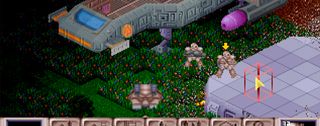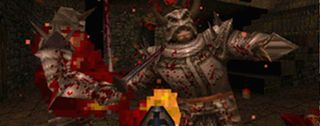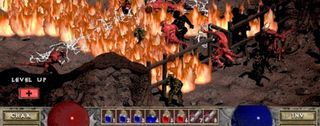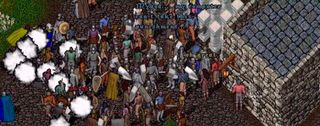The 50 most important PC games of all time
They changed how we make games, how we play games, and they changed us.

UFO: Enemy Unknown (X-COM: UFO Defense)
Released: March 1994 | Developer: Mythos Games
Why it's important: A strategy game with few equals, combining turn-based tactical action with a strategic layer to give you complete control of the battle for Earth. Great atmosphere met a difficulty curve that kept you right on the edge of failure, before finally giving you the power and freedom of turning the tables and kicking ass for Planet Earth.
X-Com: UFO Defense is hard to think of as a “game.” Even to this day it seems more real, more authentic, than most other games you could play. It’s probably better to consider X-Com a simulation rather than a game. It was a fear simulator, for me anyway, as I hunched in front of my monitor late at night, night after night, 20 years ago.
X-Com: UFO Defense was important because it didn’t care about the player. It was as cold and uncaring as the void of space that spawned its horrific aliens. As a player in X-Com, you felt very small. In X-Com’s combat, the darkness was ever present, it was cloying, it was always closing in. There was no real music to telegraph how you should be feeling, instead there was a heavy, dark ambient soundscape that felt like a transmission straight out of deep space. There was no reassuring UI that told you how well you were doing, or gave you a sense that these aliens could actually be killed. Combat was unpredictable, so you never felt comfortable. Every shot could be the one that saved you, or doomed you. Your soldiers, veterans of multiple missions, companions for tens of hours of your life, could fall as easily as leaves in an autumn breeze. The tension was horrific.
X-Com: UFO Defense was as cold and uncaring as the void of space that spawned its horrific aliens.
But for all of its unpredictability, X-Com was not cruel. It did not delight in your failures. It simply did not care. It did not care if you slowly clawed your way to victory or if you fell, and the entire Earth fell with you. X-Com did not take the time to congratulate you or admonish you with silly snips of music, or gaudy showers of UI, or bombastic cinematics. X-Com just kept the dark wheels of its simulation turning, inexorably turning.
X-Com wasn’t a game, it was a fully contained world that existed behind your monitor, as subject to its own rules as you were. My experiences in X-Com, my memories there, are as authentic to me as any others I have from that time in my life. It was a forerunner of simulations today that trade in authenticity, like Day Z, and Dwarf Fortress. X-Com was, and still is, one of the most important games of all time. — Jake Solomon

Quake
Released: June 1996 | Developer: id Software
PC Gamer Newsletter
Sign up to get the best content of the week, and great gaming deals, as picked by the editors.
Why it's important: If Doom invented deathmatch, Quake perfected it. It arrived at a time when playing online wasn’t just a pipe-dream for anyone not living in dorms, with its physics and full 3D and modding universe largely creating the idea of a game as an ecosystem. Rocket jump!
Quake was just immense, and for much more than its 3D graphics. Quake established and popularized a style of movement—an unnatural, not entirely intentional swirl of running, strafing, and jumping—which is now embedded in the culture of shooters, and in many mutated forms wherever game characters move around polygonal levels. Quake wasn’t the first at all of this—I’d never forget the likes of Marathon—but it can be considered the first complete text to describe the modern FPS.
And though online multiplayer easily pre-dates it, Quake’s complexity set a new bar at a time when I was mostly familiar with LAN-based and hotseat multiplayer, and helped dawn an age of clans and modding and sharing. Quake loudly reaffirmed that players should be creative participants, not just consumers, and the resulting 20 years of history are rich with its influence: Team Fortress started as a Quake mod. Diary of a Camper, a Quake demo file, is regarded as the first example of machinima shared over the internet. Half-Life was built on a modified Quake engine.
Though I ultimately became much more invested in Quake II—actually, far too invested, as my grades reflected—I consider both games the catalyst for my interest in game design and programming. I remember staying up all night to fix a leak in a new map—oh God, the leaks—and eagerly studying 3D modeling tutorials because I wanted to make a Star Trek mod with phasers. I never completed my mod, but I learned a great respect for those who did.
I remember looking at those blocky corridors and thinking that they could become any place, where you could do anything if you knew how. I made a lot of low-gravity tubes, but I also tried to make pretty places without any of the original maps’ stern architecture. And not even to release and play in: I just wanted to make somewhere new to be. I wonder if John Carmack and Michael Abrash felt similarly when they were programming these artificial realities, dreaming of the technology they’re making now at Oculus. id Software was not on the cutting edge by any fluke—they weren’t just interested in selling good software, they were establishing the incredible art of creating new places, and their work was a vital hub for the ever spreading map of digital geography. Like Rome, all roads lead to Quake. — Tyler Wilde

Tomb Raider
Released: November 1996 | Developer: Core Design
Why it's important: One of the most recognisable faces and action games this side of Mario. It created arguably the world’s first digital superstar in Lara Croft, as well as being the most successful female-fronted game series ever made. The series continues to break new ground.
What was it that made this ground-breaking game such a success? I think I can sum it up in two words: TANK CONTROLS. Everybody loves them, as we all know, but maybe that answer is too obvious. Let me dig a little deeper...
If you look at the marketing art for a Tomb Raider game, you'd think the main draw was action. Adventure! Shooting stuff! But for me, Tomb Raider was always a game about quiet exploration. (There's some words no marketing person wants to put on the front of a box! "Come check out this game of QUIET EXPLORATION!") But I loved losing myself in Tomb Raider's mysterious environments and uncovering their low-poly secrets. Is that a texture perspective bug? Or is it a secret passageway? One that leads to a secret grotto, that drains into a secret cavern that winds down to a secret underground temple? And then... a big empty room? Or is it? Inching forward, step by step... out of the darkness emerges... the face of a GIANT SPHYNX!
Cooooooool.
And then you shoot a monkey. And an endangered wolf. Then a beautiful and majestic lion that got between you and a switch you really wanted to pull. Seriously, Lara Croft hates animals. But she can handstand-backflip up onto a ledge so who cares?
tl;dr: TANK CONTROLS RULE! — Tim Schafer

Diablo
Released: December 1996 | Developer: Blizzard North
Why it's important: The RPG, freed of its complexities and brutal difficulty, and reforged into a form that anyone could play and become hooked on. Its love of loot lives on in everything from action games to more traditional RPGs to the entire MMO genre.
Intoxicating atmosphere, genre-defining gameplay, and a cutting-edge multiplayer experience made Diablo an instant classic. So many roleplaying games boil down to the combat anyway, but Diablo set aside all pretense of being about anything else. Its refined and polished core action far exceeded that of just about any other game of its time: All you needed to do was click, and all sorts of exciting stuff would happen—your warrior would lop the heads off the Hidden, your sorcerer would blow up a pack of skeletons with a barrage of fireballs, your rogue would take the dreaded Butcher down in a hail of arrows before he could get too close... but the depth was there, too, and how you built and outfitted your character had a lot to do with how deep you could delve into Diablo's endlessly challenging levels.
Diablo's randomly generated levels and randomly determined quests made for a uniquely replayable game, as well. There just wasn't anything out there that compared with assaulting Diablo's forces either alone or with your friends or strangers, as you set out to rid the town of Tristram of the monster waiting far beneath the ground. Today, Diablo's influence remains as strong as ever near on 20 years after the game's release. — Greg Kasavin

Ultima Online
Released: September 1997 | Developer: Origin Systems
Why it's important: Not simply another MMO, but a whole virtual world. Ultima Online gave players almost full freedom to live a virtual life, spoiled only by how many of them proved to be less than worthy of the Eight Virtues. On the plus side, it spawned fantastic moments, not least the assassination of wise Lord British himself, in one of the most beloved early MMO stories.
Ultima Online was my first encounter with MMOs and, I think, one of my first encounters with games journalism. I read a diary in what may have been PC Gamer or may have been PC Zone—it's probably bad that I've forgotten, given what I do for a living now, but I was ten, so whatever—and what they described sounded like a game from the future. Your adventures were entirely self-determined. Your biggest foes, and friends, were other people. The game had no levels, few boundaries, simply a world to explore.
Games had started out as diversions and gradually become hobbies, but Ultima Online was the point where they tipped over into becoming another life. The notion that you'd participate in this shared world not to beat it, but simply to exist and survive, was revolutionary. Games were no longer about the player and their abilities, but about societies and their stories. This was a big leap both in terms of technical sophisitication, but also in terms of what games could aspire to be. Almost twenty years later, only a handful of games have ever matched UO's original ambition. EVE is one of the few.
It barely ran on my parents' PC, and I was terrible at it. I didn't understand its labyrinthine skill system, or how crafting worked. My abiding memory is being chased down by two heavily-armed men in the forest. They killed me and took my clothes and my bread, which was everything I owned, and then I never saw them again.
It was incredible. — Chris Thursten

Wes has been covering games and hardware for more than 10 years, first at tech sites like The Wirecutter and Tested before joining the PC Gamer team in 2014. Wes plays a little bit of everything, but he'll always jump at the chance to cover emulation and Japanese games.
When he's not obsessively optimizing and re-optimizing a tangle of conveyor belts in Satisfactory (it's really becoming a problem), he's probably playing a 20-year-old Final Fantasy or some opaque ASCII roguelike. With a focus on writing and editing features, he seeks out personal stories and in-depth histories from the corners of PC gaming and its niche communities. 50% pizza by volume (deep dish, to be specific).
Most Popular



